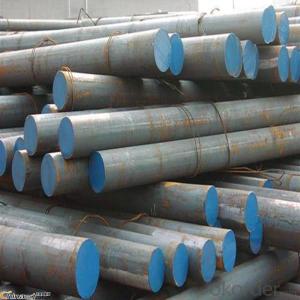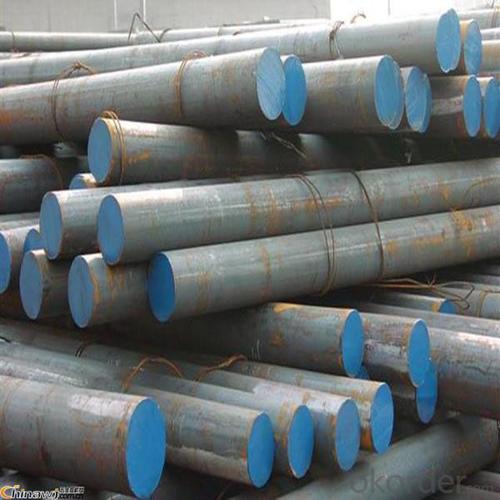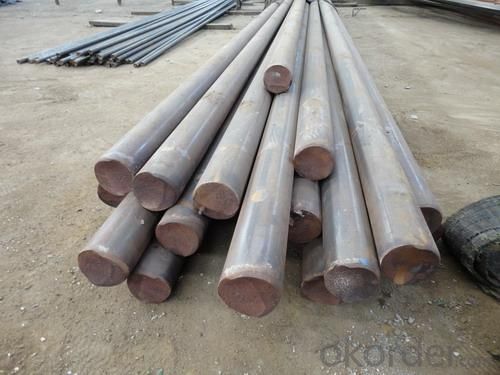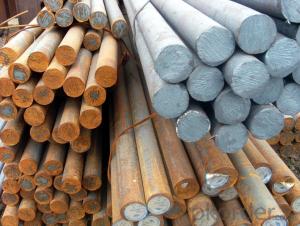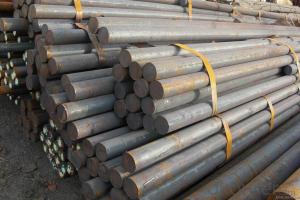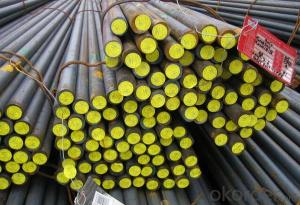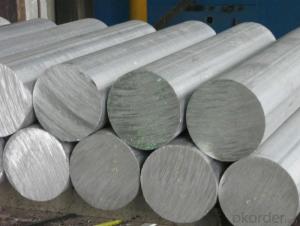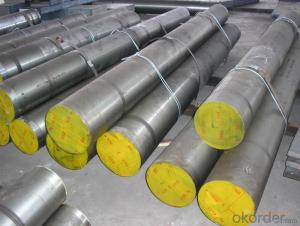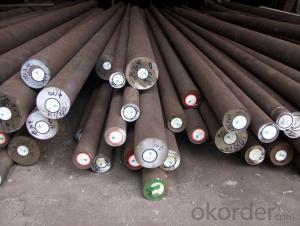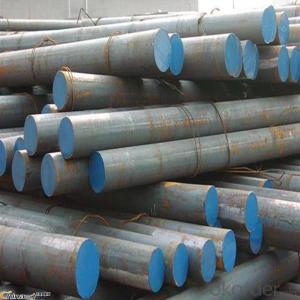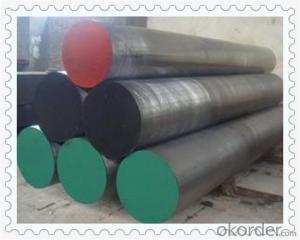SAE 4140 4150 4340 Alloy Steel Round Steel Bar
- Loading Port:
- China main port
- Payment Terms:
- TT OR LC
- Min Order Qty:
- 30 m.t.
- Supply Capability:
- 10000 m.t./month
OKorder Service Pledge
OKorder Financial Service
You Might Also Like
Specification
SAE 4140 4150 4340 Alloy Steel Round Steel Bar
Product Information:
1.Grade:SAE8620 SNCM220 805M20 4150 4140 4130 EN24 4340
2.Size: 12mm-300mm
3.Standard Performed: ASTM A29/A29M-04
4.Quality: AISI8620
Chemical Composition(%)
| Grade | C | Si | Mn | P | S | Cr | Ni | Mo |
| 8620 | 0.18-0.23 | 0.15-0.35 | 0.70-0.90 | Max 0.035 | Max 0.035 | 0.40-0.60 | 0.40-0.70 | 0.15-0.25 |
Product Overviews:
| Product Name | Typical Grades | Diameter(mm) | Standard adopted |
| Carbon Steel | 20 (1020/S20C/C22) | Ø16-Ø300 | GB/SAE/JIS/DIN |
| 40 (1040/S40C/C40) | |||
| 45 (1045/S45C/C45) | |||
| Bearing Steel | GCr9 (51100/SUJ1) | Ø12-Ø250 | |
| GCr15 (52100/SUJ2/100Gr6) | |||
| GCr9SiMn (A485-Gr.1/SUJ3) | |||
| Cr-Mo Steel | 20Cr (5120/SCr420H/20Cr4) | Ø12-Ø250 | |
| 40Cr (5140/SCr440/41Cr4) | |||
| 42CrMo(4140/SCM440/42CrMo4) | |||
| Gear Steel | 20CrNiMo | Ø16-Ø600 | |
| 20CrMn(5115/SMnC420/20MnCr5) | |||
| 20CrNiMo(8620/SNCM220/20CrMiMo2) |
Product Show:

Our Advantages:
· Industry experience over 20 years.
· Shipment of goods -More than 70 countries worldwide.
· The most convenient transport and prompt delivery.
· Competitive price with best service.
· High technical production line with top quality products.
· High reputation based on best quality products.
With our experienced, enthusiastic and dynamic staffs, we assure to bring you the products with best quality, reasonable prices and good after-sales services under the motto: Friends First, Business After.
Communication, Experience, Expertise and Best efforts are our Promises to you.
- Q: Can special steel be used in the production of gears?
- Yes, special steel can be used in the production of gears. Special steel is often chosen for gear manufacturing due to its high strength, durability, and resistance to wear and fatigue. It allows for the production of gears that can withstand heavy loads, high speeds, and harsh operating conditions.
- Q: What are the different cutting tools used for machining special steel?
- Some different cutting tools used for machining special steel include carbide inserts, high-speed steel (HSS) end mills, diamond-coated tools, and ceramic cutting tools. These tools are designed to withstand the high hardness and heat resistance of special steels, ensuring precise and efficient cutting operations.
- Q: What are the factors that affect the corrosion resistance of special steel?
- The factors that affect the corrosion resistance of special steel include the composition and content of alloying elements, surface finish and treatment, environmental conditions such as temperature, humidity, and exposure to chemicals, as well as the presence of protective coatings or inhibitors. Additionally, the manufacturing process and heat treatment can also influence the corrosion resistance of special steel.
- Q: How does special steel contribute to the energy industry?
- Special steel contributes to the energy industry in various ways. It is widely used in the manufacturing of turbines, generators, and other critical components for power plants. Its high strength, durability, and corrosion resistance properties make it suitable for withstanding the extreme conditions found in power generation facilities. Additionally, special steel plays a crucial role in the production of pipelines and storage tanks for the oil and gas sector, ensuring the safe and efficient transportation and storage of energy resources. Overall, special steel enhances the reliability and efficiency of energy infrastructure, supporting the growth and sustainability of the energy industry.
- Q: What are the requirements for special steel used in railway applications?
- The requirements for special steel used in railway applications are quite stringent due to the demanding nature of the industry. Here are some of the key requirements: 1. High strength and durability: Special steel used in railway applications must have excellent strength and durability to withstand the heavy loads and constant vibrations experienced by trains. This helps prevent deformation, fatigue, and failure of the steel components. 2. Wear resistance: Railway tracks and other components are subject to significant wear and tear due to the constant movement of trains. Special steel used in railway applications should have good wear resistance to ensure a longer service life and reduce maintenance costs. 3. Corrosion resistance: Railway tracks and structures are often exposed to various environmental conditions, such as rain, snow, and chemicals. Special steel used in railway applications should have high corrosion resistance to prevent rusting and degradation, ensuring the longevity of the components. 4. Fatigue resistance: Trains undergo repetitive loading cycles, leading to fatigue in the steel components. Special steel should have excellent fatigue resistance to prevent cracking and failure, thereby ensuring the safety and reliability of railway systems. 5. High impact toughness: Special steel used in railway applications must possess high impact toughness to absorb energy during sudden shocks or accidents. This helps prevent catastrophic failures and ensures the safety of passengers and railway personnel. 6. Heat resistance: In some railway applications, such as high-speed trains, steel components are exposed to high temperatures due to friction or other sources. Special steel should have good heat resistance to maintain its mechanical properties and structural integrity even under elevated temperatures. 7. Dimensional stability: Special steel used in railway applications should exhibit excellent dimensional stability to maintain the required tolerances and alignment of various components. This ensures smooth operation, reduces noise, and prevents excessive wear. These are some of the primary requirements for special steel used in railway applications. Meeting these requirements is crucial to ensure the safe, reliable, and efficient operation of railway systems.
- Q: What are the common surface treatments applied to special steel?
- Some common surface treatments applied to special steel include galvanizing, powder coating, electroplating, and heat treatments such as case hardening. These treatments help improve the corrosion resistance, hardness, and appearance of the steel, making it suitable for various applications in industries like construction, automotive, and aerospace.
- Q: What are the different methods for electroplating special steel?
- There are several methods for electroplating special steel, depending on the specific requirements and desired outcome. Here are some of the different methods commonly used in electroplating special steel: 1. Electroless Nickel Plating: This method involves the use of a chemical reaction to deposit a layer of nickel onto the steel surface. It is a popular choice for achieving uniform and corrosion-resistant coatings on special steel. 2. Zinc Plating: Zinc plating is widely used to provide a protective layer on special steel. It involves the immersion of the steel in a zinc solution and passing an electric current to facilitate the deposition of zinc onto the surface. 3. Copper Plating: Copper plating is used to enhance the conductivity and corrosion resistance of special steel. It involves immersing the steel in a copper sulfate solution and applying an electric current to deposit a layer of copper onto the surface. 4. Chromium Plating: Chromium plating is a common method used to provide a decorative, corrosion-resistant, and hard-wearing surface on special steel. It involves the immersion of the steel in a chromium bath and the application of an electric current to deposit a layer of chromium onto the surface. 5. Electroplating with Precious Metals: Special steel can also be electroplated with precious metals such as gold, silver, or platinum for decorative or functional purposes. These coatings are often used to enhance the appearance, conductivity, or corrosion resistance of the steel. 6. Electroplating with Alloy Coatings: For specific applications, special steel can be electroplated with alloy coatings, such as tin-zinc or tin-lead, to provide unique properties such as enhanced solderability or improved wear resistance. It is important to note that the choice of electroplating method depends on factors such as the desired properties, the intended application, and the specific requirements of the special steel being plated. Each method has its advantages and limitations, and it is recommended to consult with experts in the field to determine the most suitable method for electroplating special steel in a given scenario.
- Q: What are the applications of corrosion-resistant steel?
- Corrosion-resistant steel has a wide range of applications in various industries. It is commonly used in the construction of buildings, bridges, and infrastructure in coastal areas or places with high humidity, as it can withstand exposure to corrosive elements like saltwater and moisture. It is also utilized in the automotive and aerospace industries, where it provides durability and longevity to components exposed to harsh environments. Additionally, corrosion-resistant steel is extensively used in manufacturing equipment and storage tanks for chemicals, pharmaceuticals, and food processing, as it ensures the integrity and safety of these materials.
- Q: How does special steel perform in high-vibration applications?
- Special steel is known for its excellent performance in high-vibration applications. Its unique composition and properties make it highly resistant to the effects of vibration, ensuring optimal performance and durability in such environments. One of the key features of special steel is its high tensile strength. This strength allows it to withstand the forces and stresses generated by vibration without undergoing deformation or failure. This property is vital in high-vibration applications, where constant movement and oscillation can subject materials to significant stress. Moreover, special steel exhibits exceptional fatigue strength, meaning it can endure repeated cycles of stress and vibration without compromising its structural integrity. This makes it ideal for applications that involve continuous or cyclic vibration, such as machinery, equipment, and structures subjected to dynamic loads. Additionally, special steel possesses excellent damping properties. Damping refers to the ability of a material to absorb and dissipate energy generated by vibrations. Special steel's superior damping characteristics help reduce the magnitude and duration of vibrations, minimizing the impact on the surrounding components and structures. This contributes to overall system stability and reduces the risk of fatigue or premature failure. Furthermore, special steel is often engineered to have high resistance to corrosion and wear. This resistance ensures that the material remains robust and reliable even in harsh environments where vibration-induced corrosion or erosion may occur. By maintaining its protective coating and integrity, special steel can effectively withstand the challenges posed by high-vibration applications. In summary, special steel performs exceptionally well in high-vibration applications due to its high tensile strength, fatigue resistance, damping properties, and corrosion/wear resistance. Its combination of these properties ensures optimal performance, longevity, and safety in environments characterized by significant vibration and dynamic loads.
- Q: What are the different applications of stainless special steel?
- Stainless special steel finds various applications in industries like construction, automotive, aerospace, and medical. It is commonly used in the production of surgical instruments, chemical processing equipment, heat exchangers, and food processing machinery. Its corrosion resistance, strength, and ability to withstand high temperatures make it an ideal choice for applications where durability and hygiene are essential.
Send your message to us
SAE 4140 4150 4340 Alloy Steel Round Steel Bar
- Loading Port:
- China main port
- Payment Terms:
- TT OR LC
- Min Order Qty:
- 30 m.t.
- Supply Capability:
- 10000 m.t./month
OKorder Service Pledge
OKorder Financial Service
Similar products
Hot products
Hot Searches
Related keywords
